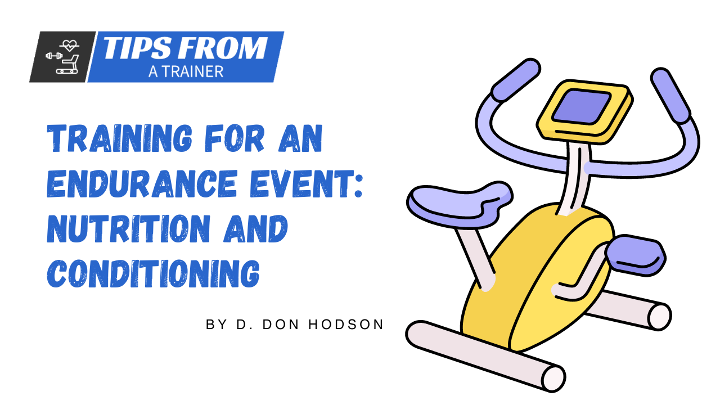Introduction
Training for an endurance event requires a combination of proper nutrition and effective conditioning. Whether you're preparing for a marathon, triathlon, cycling race, or any other endurance event, your performance will greatly depend on your physical fitness and fueling strategies. This article will provide you with comprehensive guidance on how to optimize your training program by focusing on nutrition and conditioning.
Nutrition and conditioning play critical roles in an endurance athlete's ability to perform at their best. Proper nutrition provides the fuel necessary for sustained energy, recovery, and muscle repair. Effective conditioning ensures that your body is adequately prepared to handle the physical demands of the event and helps prevent injuries.
By understanding the principles behind nutrition and conditioning, you can enhance your training, improve performance, and increase your chances of success.
Table of Contents
Introduction
Understanding Endurance Events
Definition and Types of Endurance Events
Challenges and Physical Demands
Benefits Beyond Athletic Achievement
Building a Foundation: Conditioning for Endurance Events
Assessing Your Fitness Level
Designing a Comprehensive Training Plan
Incorporating Cardiovascular Training
Integrating Strength and Cross-Training
Fueling for Success: Nutrition for Endurance Events
Understanding Nutrition's Role
Essential Macronutrients for Endurance Athletes
Pre-training and Pre-event Nutrition Strategies
Fueling During Training and Events
Hydration Strategies for Endurance Events
The Vital Role of Hydration
Pre-training and Pre-event Hydration
Hydration During Training and Events
Mental Preparation: Developing a Resilient Mindset
The Significance of Mental Preparation
Strategies for Developing Mental Resilience
Goal-Setting for Endurance Events
Overcoming Challenges and Maintaining Motivation
The Importance of Self-Care and Recovery
Conclusion

Understanding Endurance Events
Definition and Types of Endurance Events
Endurance events encompass a diverse array of athletic competitions that share a common denominator: the sustained exertion of physical effort over an extended period. These events test not only an individual's physical prowess but also mental resilience and overall fitness. Among the most notable endurance challenges are marathons, a test of the human body's ability to endure a 26.2-mile (42.2-kilometer) long-distance race. Triathlons combine swimming, cycling, and running, pushing athletes to their limits in three distinct disciplines. Cycling races, from challenging criteriums to grueling mountain stages in the Tour de France, demand exceptional cardiovascular endurance. Ultramarathons venture into the realm of extraordinary, with distances exceeding the traditional marathon, and long-distance swimming events push swimmers to traverse open waters for considerable distances.
Challenges and Physical Demands
Endurance events present a unique set of challenges that extend beyond those faced in traditional athletic competitions. Participants in endurance events must navigate a labyrinth of physical and mental hurdles. The body's limits are tested, as athletes must overcome physical fatigue and confront the psychological exhaustion that can accompany sustained exertion. An unyielding mental fortitude is essential, requiring competitors to maintain a steady pace over extended durations and manage critical factors such as hydration, nutrition, and environmental conditions. Whether scaling mountain passes on a bike, logging miles on foot, or swimming against open water currents, endurance events demand a finely-tuned blend of physical fitness and mental resilience.
Benefits Beyond Athletic Achievement
Participation in endurance events transcends mere athletic pursuit; it offers a transformative journey that extends to the realms of personal growth and well-being. While the achievement of athletic milestones is undoubtedly a part of the allure, the benefits extend far beyond medal counts. Improved cardiovascular health stands as one of the prominent rewards, as the rigorous training regimens associated with endurance events bolster heart function, reduce the risk of heart disease, and enhance overall cardiovascular well-being. The heightened stamina cultivated through endurance training elevates daily life, providing energy and vitality for everyday activities. Mental toughness is another invaluable takeaway, as the mental challenges faced during endurance events build resilience that can be applied to various aspects of life.
Building a Foundation: Conditioning for Endurance Events
Assessing Your Fitness Level
Before embarking on the journey of endurance event training, a crucial first step is to assess your current fitness level. This assessment serves as a compass, guiding you towards the most suitable training strategies and helping you set realistic goals. Through a comprehensive evaluation, you can gain insights into your strengths, weaknesses, and areas that require improvement. This self-awareness lays the foundation for a targeted and effective training plan.
Designing a Comprehensive Training Plan
A well-structured training plan is the backbone of successful endurance event preparation. It encompasses a delicate balance of frequency, intensity, duration, and progression. The frequency of training sessions per week influences your overall workload and adaptation rate. Intensity gauges the effort exerted in each session, ensuring that you're challenging yourself appropriately. Duration dictates the length of each training session, aligning with the demands of your chosen event. Progression, a key principle, involves gradually increasing the training load over time to prevent stagnation and reduce the risk of injuries.
Incorporating Cardiovascular Training
Cardiovascular training, also known as aerobic conditioning, forms the cornerstone of your endurance event preparation. Engaging in activities such as running, cycling, swimming, rowing, or using cardio machines like treadmills and ellipticals enhances your aerobic capacity, strengthens your heart, and bolsters your body's ability to deliver oxygen to working muscles. This form of training induces physiological adaptations that are pivotal for enduring long stretches of physical effort.
Integrating Strength and Cross-Training
While cardiovascular training is pivotal, neglecting strength training can be detrimental. Strength exercises help correct muscular imbalances, enhance joint stability, and improve overall body strength. Key muscle groups, such as your core, legs, and upper body, play a crucial role in supporting your performance during endurance events. Exercises like planks, squats, lunges, push-ups, and pull-ups are examples of functional movements that contribute to well-rounded strength development. In addition to strength training, cross-training offers a dual advantage. It diversifies your training routine, reducing the risk of overuse injuries, while also targeting different muscle groups and energy systems.
Fueling for Success: Nutrition for Endurance Events
Understanding Nutrition's Role
Nutrition is the cornerstone of endurance event preparation. Proper fueling not only sustains your performance but also influences your recovery, muscle maintenance, and overall well-being. Carbohydrates, proteins, and fats, known as macronutrients, each play a unique role in optimizing your body's function during exertion.
Essential Macronutrients for Endurance Athletes
Carbohydrates are the primary energy source for endurance activities. They are stored in your muscles and liver as glycogen, providing readily available fuel for your muscles. Proteins aid in muscle repair and recovery, particularly important during the training process. Adequate protein intake supports the rebuilding of muscle tissues subjected to the repetitive stresses of endurance training. Fats, often misunderstood, are an essential source of sustained energy during longer-duration activities. They become particularly relevant when glycogen stores become depleted.
Pre-training and Pre-event Nutrition Strategies
The period leading up to your training sessions and events is critical for optimizing performance. Pre-training and pre-event nutrition strategies serve to prepare your body for the impending exertion. Focus on consuming easily digestible carbohydrates to replenish glycogen stores and provide quick energy. Moderate protein intake aids in the prevention of muscle breakdown, while a small amount of healthy fats contributes to satiety and sustained energy.
Fueling During Training and Events
As you delve into the heart of endurance activities, fueling becomes a dynamic process. During activities that extend beyond 60-90 minutes, it's imperative to replenish energy to prevent the depletion of glycogen stores. Carbohydrate-rich options such as energy gels, sports drinks, energy bars, and real food can provide the necessary fuel. Timing is key; regular intervals of fuel intake help maintain stable blood sugar levels and sustain energy.
Hydration Strategies for Endurance Events
The Vital Role of Hydration
Hydration is a fundamental component of endurance event preparation, influencing your performance, body temperature regulation, and overall well-being. Adequate hydration ensures that your body can efficiently transport oxygen to working muscles and remove waste products.
Pre-training and Pre-event Hydration
Proper hydration begins before you lace up your shoes or hop on your bike. Starting your training sessions and events well-hydrated sets the stage for optimal fluid balance during exertion. In the hours leading up to your activity, focus on consuming fluids that contain both water and electrolytes to ensure proper hydration.
Hydration During Training and Events
The execution of your hydration strategy during training and events is crucial. Balancing fluid intake with sweat loss is a delicate task. Adhering to the principle of "drink to thirst" guides your hydration efforts, ensuring that you maintain fluid balance without overloading your system. Electrolytes, including sodium, potassium, and magnesium, play a vital role in fluid retention and nerve function.
Mental Preparation: Developing a Resilient Mindset
The Significance of Mental Preparation
While physical prowess is a cornerstone of endurance event success, mental resilience is equally essential. Developing a robust mental framework enhances your focus, motivation, and overall performance. The intricate interplay between the mind and body becomes evident as you strive to achieve your endurance goals.
Strategies for Developing Mental Resilience
Cultivating mental resilience requires a multifaceted approach. Visualization is a powerful technique where you mentally rehearse successful outcomes. Positive self-talk helps combat self-doubt and negative thoughts, replacing them with affirmations of your capabilities. Goal-setting provides direction and purpose, breaking down your journey into achievable milestones. Mindfulness, the practice of being present in the moment, aids in managing stress and enhancing focus.
Goal-Setting for Endurance Events
Clear and well-defined goals serve as the North Star of your endurance journey. Setting goals offers direction, motivation, and a sense of accomplishment. When crafting your goals, consider the SMART framework: Specific, Measurable, Attainable, Relevant, and Time-bound.
Overcoming Challenges and Maintaining Motivation
Endurance training and events are not without their share of challenges. Fatigue, injuries, self-doubt, and plateaus can test your resolve. Overcoming these hurdles requires a combination of strategies. Seek support from training partners, coaches, and peers who can offer guidance and encouragement. Adapt your training plan when necessary, making adjustments based on your body's signals. Practicing self-care, including adequate sleep, proper nutrition, and recovery techniques, ensures that you're equipped to handle the physical and mental demands of your training.
The Importance of Self-Care and Recovery
The pursuit of endurance greatness is a holistic journey that extends beyond physical exertion. Prioritizing self-care and recovery is pivotal to ensuring that your body and mind remain in optimal condition.
Conclusion
In the realm of endurance events, the convergence of physical and mental preparation culminates in a symphony of human achievement. Understanding the nuances of conditioning, nutrition, hydration, and mental resilience crafts a comprehensive approach to your training.
As you pedal, stride, or swim towards your goals, remember that success is woven from meticulous planning, unwavering determination, and the unbreakable bond between your body and mind. Every step, every heartbeat, and every drop of sweat contribute to your enduring journey towards triumph.

Don Hodson, Certified Personal Trainer
I'm Don, an ACE-certified personal trainer and the founder of Tips From A Trainer. With my passion for fitness and years of experience, I've helped countless individuals transform their physiques!
Having personally overcome weight challenges throughout my life, I understand the struggle. Through consistency, exercise, and a balanced diet, I have managed to stay in shape and I want to share my message with the world!
The fitness industry is fraught with misconceptions and deceptive practices, which is why I am committed to providing you with the truth.
- My Site: www.Don-Hodson.com
- My Company: www.ConnectedAgeMarketing.com

Training for an Endurance Event